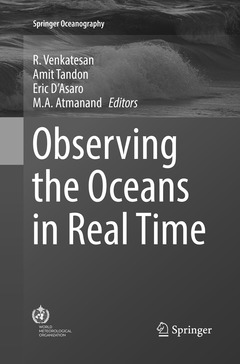Observing the Oceans in Real Time, Softcover reprint of the original 1st ed. 2018 Springer Oceanography Series

Part 1. Introduction.- 1. Recent Trends in Ocean Observations.- Part 2. Surface Observations.- 2. Observing Surface Meteorology and Air-Sea Fluxes.- 3. Drifter Technology and Impacts for Sea Surface Temperature, Sea-Level Pressure and Ocean Circulation Studies.- 4. Origin, Tranformation and Measurement of Waves in Ocean.- Part 3. Subsurface Observations.- 5. Oceanographic Floats- Principles of Operation.- 6. . Measuring Ocean Turbulence.- 7. New Science and Novel Approaches Enabled by Autonomous Gliders.- 8. Advances in In-Situ Ocean Measurements.- Part 4. Remote Sensing.- 9. Ocean Remote Sensing: Concept to Realization for Physical Oceanographic Studies.- 10. Near Real-time Underwater Passive Acoustic Monitoring of Natural and Anthropogenic Sounds.- 11. Data Return Aspects of CODAR and WERA High Frequency Radars in Mapping Currents.- Part 5. Data (Data Management).- 12. Sensor Performance and Data Quality Control.- 13. Near Real Time Data Recovery from Oceanographic Moorings.- 14. Managing Metocean In Situ Data in the WMO Framework.- Part 6. Societal Applilications.- 15. Applications of Ocean In-Situ Observations and its Societal Relevance.
R. Venkatesan is a Scientist G at the National Institute of Ocean Technology, Ministry of Earth Sciences, India and served under the UNEP Regional Seas Program. He received a MTech from Karnataka Regional Engineering College and a Ph.D. from the Indian Institute of Science, India and completed course in Marine Environmental Pollution & Management. He is working on ocean observations and is also teaching Ocean Policy and Ocean observation tools as an Adjunct faculty. He has evolved and executed societal relevant projects and supports Students. He is honoured by MTS Lockheed Martin award and National Geoscience award; Serving as a Member of Steering Committee of GOOS/UNESCO/IOC, DOOS, OceanSITES; Chair of International Tsunameter Partnership, IEEE-OES India and founder Chairman of MTS India.
Amit Tandon is a Professor at the College of Engineering and the School of Marine Science and Technology at UMass Dartmouth. After obtaining his PhD from Cornell University in 1992, Tandon was a UCAR postdoctoral fellow in Ocean Modeling, and in Climate System Modeling. Tandon, a Fulbright awardee and a Fulbright specialist, is a physical oceanographer whose research involves upper ocean dynamics, from mixing at microscales and Langmuir cells to frontal sub-mesoscale and mesoscale processes in the ocean, and their impact on air-sea interaction and the large-scale ocean circulation. His current research involves investigating the role of these sub-grid processes in global oceans.
Eric Arthur D’Asaro is a Senior Principal Oceanographer at the Applied Physics Laboratory, University of Washington and a Professor of Oceanography at the University of Washington. He received a M.S. in Applied Physics from Harvard University and a Ph.D. from the joint program in Oceanography of the Woods Hole Oceanographic Institution and the Massachusetts Institute of Technology. He received the Sverdrup Gold Medal of the American Meteorological Socie
Date de parution : 06-2018
Ouvrage de 323 p.
15.5x23.5 cm
Date de parution : 11-2017
Ouvrage de 323 p.
15.5x23.5 cm



